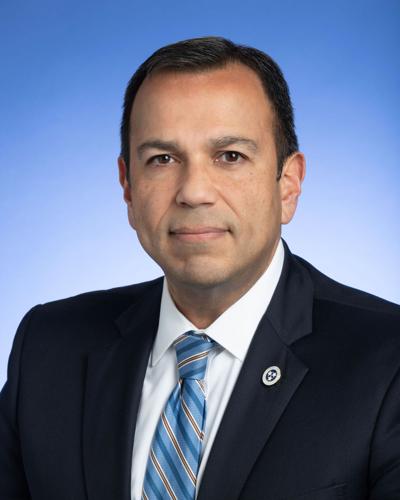
Dr. Ralph Alvarado
Ralph Alvarado, commissioner of the Tennessee Department of Health, is zeroing in on care for the aging population in 2025.
Last month Alvarado asked Gov. Bill Lee for $7 million in recurring state funding to establish the Tennessee Memory Assessment Network and $3.7 million to stand up five assessment clinics in rural areas. Also in November he announced the creation of an Office of Healthy Aging.
The Lee appointee sat down with the Scene to review some of the state’s biggest health-related matters: aging, opioid abatement and HIV funding and vaccines. (As far as abortion care goes, Alvarado says the department doesn’t take a stance on the issue, but he has supported abortion bans as a former Kentucky state senator.)
Aging
Whether the health care system has enough capacity to take care of the aging population is now an imminent question, Alvarado says. The new Office of Healthy Aging is tasked with pursuing Centers for Disease Control and Prevention funding for dementia care, as well as establishing a new state dementia director position and a dementia navigator program with local health departments.
“We want to be able to improve the quality of life for people that are older and to be able to collaborate with others,” Alvarado tells the Scene. “Part of that is if you’re going to have a focus on it, you need to create an Office of Healthy Aging to be prepared to tackle a lot of those needs.”
State departments ask for funds for Alzheimer’s programming, provider pay, wait lists
Alvarado notes that there is a window during which dementia and Alzheimer’s treatments are most effective, and many people miss it while they’re waiting to meet with a neuropsychiatrist. The wait can be more than a year to get an appointment at a specialized clinic in a major city. His pitched memory care network will focus on reaching rural communities. He also plans to provide more navigators to connect people with the memory care network and other resources.
“We’ve got over, I think, about $3.5 billion worth of resources for folks that are older, through TennCare and lots of other programs, but people just don’t know how to tap into it,” Alvarado says.
Opioid Abatement Funds
As opioid abatement funds are flowing into state and local governments, Alvarado sees syringe exchange — programs that allow people with substance abuse disorders to obtain clean and unused hypodermic needles — as a key solution. It’s something he’s encouraged mayors around the state to implement. During his time as a lawmaker in Kentucky, he says he saw the programs work in rural and red counties as well as in larger cities.
Millions of dollars in grants were awarded for mobile clinics, indigent services, pregnancy care
“We thought it would only be done in Louisville and Lexington,” he says. “After two years, 30 of the 120 [Kentucky] counties have programs. And now 60 of the 120 counties have programs in their health departments that have been very successful. People are three times more likely to enter rehab if they get into those programs, and you’re also helping reduce hepatitis C and HIV transmission.”
Stigma and concerns about the appearance of encouraging drug use have stunted these programs in the past, Alvarado says.
“The people that need help, folks in their minds have an image of what that person looks like,” he says. “A lot of these are folks that work in places we would work in. They look like you and I. They’re often no longer even getting high, they’re just trying to keep from withdrawing, and they don’t know how to get off the hamster wheel, if you will, and they’re looking for help.”
HIV Program Funding
Shortly after he took on the health department role, Alvarado and the state opted not to take $9 million in CDC funding for HIV prevention programming, and instead were granted the same amount from the Tennessee General Assembly. The CDC crafted a work-around and granted the state $4 million to Tennessee organizations anyway.
Nashville Cares makes contingency plans while Metro fields demand
Alvarado says the department refused the funds because they were underutilized due to federal strings attached and organizations having to wait for reimbursement.
“That money is being used much, much more efficiently,” he tells the Scene. “Because when we give those grants, we give a very broad grant — it’s a simple one — and we give them to our partners and say, ‘Here is the money up front.’ … They’re utilizing a lot more of it.”
Vaccines
As a physician, Alvarado supported the COVID-19 vaccine, but ultimately suggests people talk to their local physicians about vaccinations.
“If people can have debates on social media and in different kinds of scenarios, ultimately, the questions and answers should be with your provider that you trust, and will be able to answer those questions for you,” he says.
He also notes concerns around kindergarten vaccination rates dropping.
“I’ve started talking to a lot of our doctors in our state, also to start looking at disease states again, because if our vaccination rates continue to drop, we’re going to start seeing infections like diphtheria and tetanus and pertussis,” he says.








